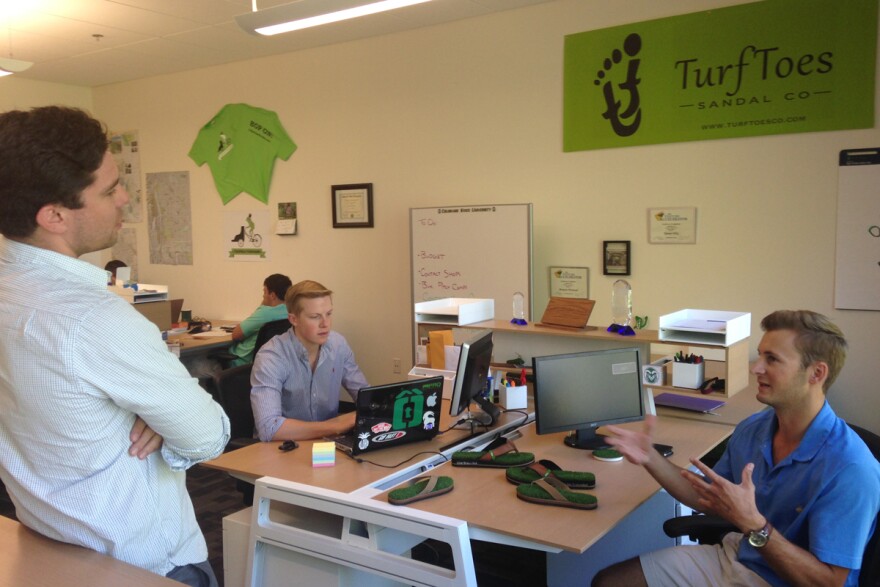Braxton Norwood wants you to enjoy the feeling of grass between your toes – all day long. Norwood, a Colorado State University student and budding entrepreneur, has launched a company called TurfToes.
The company's name describes its product. They create sandals with bottoms made from artificial turf. If that sounds…scratchy, Norwood, who spent a summer working for an artificial turf company, and is somewhat obsessed with fake grass, offers a spirited pitch.
"It's crazy how much it looks and even feels like actual grass," said the clean-cut senior, whose smile conveys confident enthusiasm. "Most sandals after you wear them for a while, wear out. We like to think of our sandals as wearing in. They get better over time," he said.
Norwood's idea came after he spent a semester abroad in Barcelona, which had little grass. He missed walking on turf, and when he got home he started "putting [artificial] grass on funky things...my whole bathroom is a putting green."
One day, he got a pair of sandals from Wal-Mart, and covered the sole with artificial grass, scavenged from a dumpster at his work. He started wearing them around, and got noticed.
"People kept on telling me, OMG, I would love to buy a pair of these," he recalled. At first, he wrote the comments off.
"But after a while, I started to think, this is actually something that could catch on, if this many people are interested." He got a business-minded friend, Tanner Eley, on board, and formed a company.

Now, through Colorado State University's Venture Accelerator program, TurfToes is getting mentorship, support, and even office space.
"Essentially, what the program is all about is identifying promising student startups from all over Colorado State University," said Jessica Rawley, assistant director of the Institute for Entrepreneurship at CSU.
Students or very recent graduates can apply to the program. Twelve businesses get in each year, and they attend weekly seminars where they learn about everything from pricing models to pitching investors. Norwood recalled hearing from a speaker who had guided Apple's iPhone division, which made a big impression.
The young companies also get cash -- it comes from donors to the program, and is typically $3,000 to $5,000 per business, said Rawley. They can use it for activities like crafting websites, manufacturing prototypes and otherwise getting their business off the ground.
At the end of the year, a handful of the companies are awarded space for a year in the CSU Hatchery, which shares space in the Rocky Mountain Innosphere, an entrepreneur-focused office building. They get additional support over that year as they grow.

Local Entrepreneurs Share Tips, Experience
TurfToes also benefited from another service offered through the CSU Venture Accelerator. They had a mentor, Bill Cobb, a retired Fortune 50 executive, entrepreneur, and consultant with a wealth of business experience.
"He was amazing," said Norwood, recounting how Cobb's expertise helped shape their business plan. The business competed successfully in several entrepreneurial competitions, and they credit much of their success to Cobb.
Cobb has been involved in the Venture Accelerator for two years, and is on board with a new company for the upcoming school year. He loves working with students, and offering his experience.
"A lot of these young people have terrific ideas. But they are very naïve about the process of getting them started and commercialized," he said.
For example, TurfToes originally planned to sell their shoes direct, through an online retail store. Cobb discussed with them the hurdles involved in individually packing and shipping shoes, and collecting and paying sales tax. They ultimately decided to sell wholesale, believing the volume and benefits of working with distributors would outweigh the lower profit margin.
The Venture Accelerator, now in its third year, has supported entrepreneurial ideas ranging from a gourmet marshmallow company to a survival course program. While the future of these young companies is still unknown, a huge part of the program is training students in the craft of entrepreneurship, said CSU's Rawley.
http://youtu.be/KcT6XIjhKbU
"As entrepreneurs, just classically, your for first idea there's really high rates of non-success. And so the best thing that we can do is create those people who can be serial entrepreneurs," she said.
Inside their bright office space in the CSU Hatchery, Norwood and Eley show off their grass-coated flip-flops.
The leather straps are soft, and while the bottoms don't exactly mimic grass, the sandal bottom has a pleasant texture on the foot, almost massage-like.
While both say they would have taken the company forward without university support, they say the Venture Accelerator program made the path forward much clearer. They also gained access to competitions with funding and other support, like laptops, as prizes, which moved their business along.
"A lot of people want to start businesses and they want to do this and that, but they don't know where to start," said Norwood.
That's not a problem for TurfToes. With a Kickstarter campaign launching in late October, the company is already well on its way.






